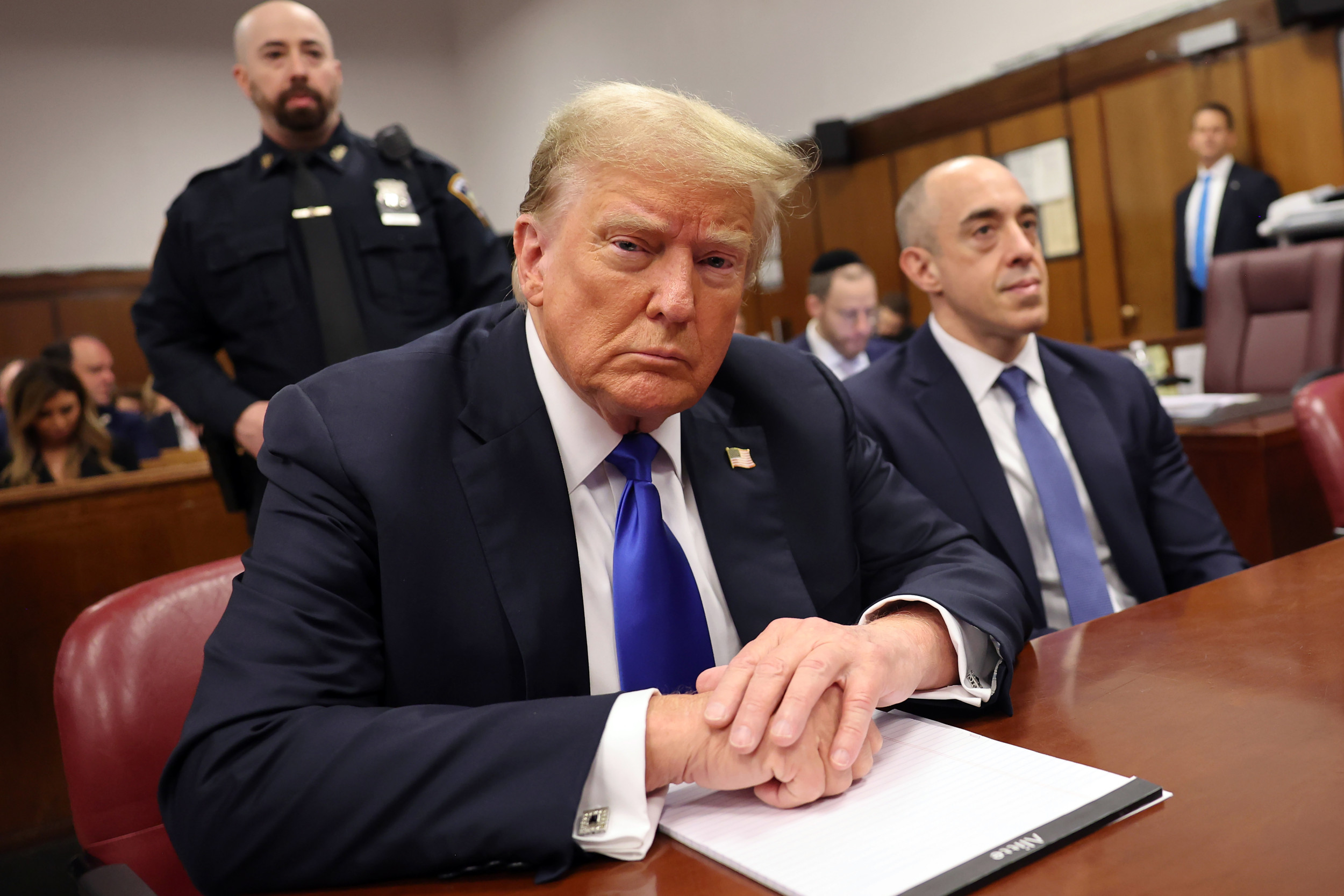To kick off his first term in Congress, he cosponsored legislation eliminating tax breaks for corporate mergers. He cosponsored another bill that would strip federal tax credits to auto-manufacturers who move jobs overseas. He appeared at a picket line last October, standing alongside autoworkers striking for better wages.
No, this man isn't a Democrat. It's President Donald Trump's running mate, Senator JD Vance.
Vance ranks as one of the most conservative members of the U.S. Senate, and his intellectualization of MAGA ideals helped propel him to the second most coveted position in the Republican Party. As the GOP has become less traditionally Republican and more MAGA under Trump, it has seen its appetite for economic populism grow.
However, the Washington Post reported last month that during Trump's last year in office, Vance messaged an acquaintance on then-Twitter, saying: "Trump has just so thoroughly failed to deliver on his economic populism (excepting a disjointed China policy)." Newsweek contacted Vance's team for further comment; however, his team told the Post that this wasn't a critique of Trump but rather the "establishment Republicans" who thwarted his agenda. Others within the MAGA movement would like to see more done as well.
Conservative politicians like Senator Josh Hawley of Missouri, one of Vance's closest allies in the Senate, and Congressman Chip Roy of Texas, policy chair of the influential Freedom Caucus, have signaled openness to push corporations to pay more in taxes, something that would've been unheard of from a Republican during the Bush years.
The Pew Research Center reported in April 2023 that 46 percent of Republicans felt "some corporations don't pay their fair share." Concurrently, 43 percent of them felt that "wealthy people don't pay their fair share." These numbers are a far cry from the 77 percent of Democrats who expressed the same sentiments, yet it signals a notable shift from Pew's polling in 2012 that found 33 percent of Republicans felt upper-income individuals paid too little in taxes.
"There's an emerging political science literature suggesting that one of the things that differentiates the Republican donors from the Republican base is the Republican donors are much more committed to sort of free market ideology," Donald P. Green, a political scientist at Columbia University told Newsweek, "whereas the Republican base is much more populist and interventionist when it comes to the economy, much more concerned about social issues than they are tax policy."
Despite the shifts among their constituents, Republican officeholders remain largely behind the Reagan-era ideals of low taxes and limited spending, with Trump himself looking to build off his 2017 achievement of lowering the corporate tax rate from 35 percent to 21 percent by cutting it further to 15 percent for companies that do not "outsource, offshore or replace American workers."

Large portions of Trump's 2017 Tax Cuts and Jobs Act expire in 2025, meaning tax policy will be one of the greatest consequences of this election and an issue that should be top of mine for voters come November 5. If Trump wins, the election could affirm that Reagan-era economics remain a driving force behind GOP success. However, if he loses, the party's decision to reject the populist desires bubbling in its base could appear toward the top of its 2024 postmortem report.
"[The parties are] going in very, very different directions, and that is a big deal, because if the country goes trifecta, one way or the other, you would have either tax policy that looks like Biden's or tax policy that looks like something between Reagan's and Trump's," Grover Norquist, president of Americans for Tax Reform (ATR), a taxpayer advocacy group he founded in 1985, told Newsweek.
Norquist has played a key role in influencing GOP tax policy for years, notably getting all the 2012 Republican presidential candidates to sign his pledge to oppose any tax increases. He remains a force within the party today, keeping in close contact with elected officials and ensuring party leaders sign his pledge, including Vance.
The Candidates' Tax Plans
Both Trump and the Democratic presidential candidate, Vice President Kamala Harris, want to eliminate taxes on tips, but Harris wants to raise the corporate tax rate to 28 percent. Trump wants to end taxes on Social Security benefits while Harris wants to raise the capital gains tax from 20 percent to 28 percent for those earning more than $1 million a year.
The vice president aims to increase the child tax credit, offer down payment assistance to first-time homebuyers, raise the tax deduction for small business and increase the Medicare tax for those earning more than $400,000. Trump, meanwhile, wants to offer tax credits for individuals who care for a parent or a loved one and, in a bid to bolster domestic manufacturing, he plans to introduce an up to 20 percent tariff on all imports, with even greater tariffs of 60 to 100 percent on goods coming from China. Norquist doesn't believe this will get a green light from Congressional Republicans.
He said it is unclear whether the president can make a unilateral move on tariffs, so assuming he must go through Congress, Trump could face opposition from Republicans in agricultural states whose constituents, he said, would face increased costs.
"Tariffs raise the cost of goods and services, reduce competition, and give you slower growth," Norquist said. "I do not believe, if he's passing laws, a Republican House and Senate would be enthusiastic about tariffs."
Tariffs, however, are supposed to be the core of the populist side of Trump's economic proposals. They are supposed to help pay for the proposed tax cuts which, even with the tariff revenue included, are estimated to drive up the nearly $35.7 trillion national debt by another $7.75 trillion, according to the nonpartisan Committee for a Responsible Federal Budget. Harris' current plan would raise it by $3.95 trillion.

Former U.S. Trade Representative Robert Lighthizer stands behind Trump's tariff policy as one of its key proponents. Having previously served as an attorney dedicated to protecting the U.S. steel industry from foreign competition, Lighthizer entered the Trump administration with a protectionist mindset that propelled him to buck free trade conservative orthodoxy and engineer Trump's 2018 trade war with China.
Lighthizer now serves as chair of the Center for American Trade at the Trump-aligned America First Policy Institute and has spent the Biden years advising Washington on how to strengthen its standing in the competition with China. Repeated interview requests to both Lighthizer and the American First Policy Institute went unreturned. However, Lighthizer has offered the following remarks in defense of Trump's tariff policy.
"Free trade purists argue that tariff increases destroy capitalism," Lighthizer wrote in The Economist last March. "When tariffs rose during the Trump administration, and that didn't happen, the purists claimed that we should ignore the facts and rely on their antiquated economic models. Now that Donald Trump has proposed a modest tariff on many goods and larger tariffs on Chinese products, Americans deserve a reasoned public discussion. His stated objective with the broader tariff is to reduce America's trade deficit and to rejuvenate American manufacturing."
Newsweek contacted the Trump campaign for further comment.
Republicans Split on Tax
The idea of increasing domestic manufacturing is one shared by President Joe Biden who's passed legislation investing in domestic semiconductor manufacturing, infrastructure construction, and green energy production. While not all these acts earned him Republican praise, some did. Other aspects of the president's proposed agenda—ones that contradicted Trump, however—have garnered GOP support as well.
When Biden entered the House Chamber to deliver his State of the Union address on March 7, about two of the least likely lawmakers one would expect to applaud his remarks were Hawley and Senator Ted Cruz of Texas. Yet, they did just that when he proposed the following.
"No billionaire should pay a lower tax rate than a teacher, a sanitation worker, a nurse," Biden said during his March 7 address. "That's why I've proposed a minimum tax of 25 percent for billionaires. Just 25 percent. That would raise $500 billion over the next 10 years."
The two men rank among the Republican Party's most conservatives' lawmakers in a time where the two parties are historically polarized. Much of the president's address saw half the chamber on their feet while much of the other half sat and frowned and sometimes jeered. Only occasionally did the Republican Party's more centrist members, like Senator Mitt Romney of Utah, stand and applaud in affirmation of the president's proposals.
The move came as a bit of a surprise from Cruz. But for Hawley, it reflected a pattern of populistic behavior that has included the Missouri Republican appearing at union picket lines, accusing Big Tech firms of violating antitrust law, and condemning corporations for offshoring production. These two are not the only lawmakers to signal approval toward raising taxes on billionaires, or at the very least abstaining from offering them further cuts.
Congressman Roy of Texas told Politico in June that he'd "like to see corporations getting with the program and saving America, instead of just looking at their bottom line," signaling to the outlet that he'd consider kicking the corporate rate up to 25 percent.
Ways and Means Committee Chair Jason Smith of Missouri, who will have an outsize role in guiding future tax policy, should he remain the top Republican on that powerful committee, similarly signaled to Politico that he believes corporations have benefited too greatly from tax breaks while doing too little to support American growth as it competes with China.

Norquist dismissed the idea that Cruz and Smith would support tax increases on corporations and top earners, noting the two have signed his no-tax pledge. He believes Roy's stance stems from frustrations with the social positions of certain large corporations. And as for Hawley, Norquist said his efforts to expand his appeal among labor unions and segments of the left have put him in a "weaker position" than other Republicans in the state, making for a tougher than necessary 2024 reelection campaign.
"[Democrats] always fool themselves that Republicans will give them a tax increase, and any Republican who desperately wants to make their point about how they're unhappy at Disney because of their cultural stuff can get on TV or in a newspaper article if they threaten a tax increase," Norquist said. He believes the GOP base remains firmly aligned with his positions, stating voters do not believe a tax increase will reduce the deficit and will instead go toward increasing the size of government.
Tax Cuts Could Hurt the Republicans' Base
Nonetheless, Republicans have become increasingly reliant on government services as the party has become more working-class and less college-educated under Trump. The Wall Street Journal reports that in 2020, Biden won 240 counties that receive "significant government assistance" while Trump won 1,746. In 2012, Obama won 237 counties in need of significant assistance while Romney won 992. Five swing states—Michigan, Arizona, Pennsylvania, North Carolina, and Georgia—all rank above the U.S. average in their number of counties that received significant assistance.
Despite that fact, Steven Rosenthal, a senior fellow at the nonpartisan Tax Policy Center, a joint venture between the Urban Institute and the Brookings Institution, believes that Trump's proposals will exacerbate economic inequality in the U.S. He said Trump's social security and tips tax cuts would shift government operational funding toward richer Americans and believes cutting taxes for corporations would disproportionately benefit the wealthy while entrenching the nation in debt.
In 2022, the main imports were consumer goods (27 percent), capital goods (26 percent), and industrial supplies (25 percent) followed by automotive vehicles, parts and engines (12 percent), and foods, feeds and beverages (6 percent), according to Trading Economics. If Trump has his way with new tariffs, Rosenthal said the policy would disproportionately harm lower-earning Americans who spend a larger share of their income on consumer goods
"Trump's proposals would aggravate wealth inequality and income inequality," he told Newsweek. "One thing that Trump does like to do is double down on things he's done before, and he wants to claim that his earlier tax bills were a great success and launched us to the fantastic economic circumstance our country is now enjoying."
While conservatives remain intent on their position that tax cuts will stimulate economic growth, Democrats have continued to push the message that Trump's actions are indicative of a billionaire wanting to save extra dollars for himself and his wealthy friends.
"Right now, the tax code is rigged to benefit the richest corporations and the richest people instead of the majority of Americans—but we have a chance to change that in 2025," Democratic Senator Elizabeth Warren of Massachusetts told Newsweek in a statement. "This is an opportunity to fight for a tax code that reflects our values by making billionaires and big businesses pay their fair share, lifting up the middle class with investments in child care and housing, and rejecting bad deals that give the ultra-wealthy even more tax giveaways."

Warren serves on the Senate Finance Committee, which will be responsible for writing tax policy in 2025. A longtime advocate for increased taxes on the wealthy, Warren has recently hit the campaign trail, appearing in Pennsylvania to pitch her concerns to voters in the key swing state. And she's not the only popular progressive campaigning for her party's more centrist presidential ticket.
'We're Going To Give You Tax Cuts'
In April, the then Biden campaign released an ad featuring Biden and Vermont Senator Bernie Sanders disapprovingly watching a video of Trump addressing his donors at a private event.
Positioned behind a white podium adorned with ornamental gold trim in his multi-million-dollar Palm Beach compound, Mar-a-Lago, Trump is seen speaking to a group of supporters, rallying them to open to their wallets to advance the MAGA cause.
"You got to help them financially because you are all people that have a lot of money. I know 20 of you, and you're rich as hell," Trump said to chuckles. "We're going to give you tax cuts," he later said, to which the crowd erupted into a high pitch: "Wooooo!"
The video of this, which was posted live to Facebook by Robert Ward—a 2017 Raleigh city council candidate whose profile picture features himself, Trump, and North Carolina gubernatorial candidate Mark Robinson, flashing thumbs-up—made its rounds across the internet when it was reported by Mediaite on December 16, 2023. Democrats point to it as evidence that Trump's true interests do not align with his supporters.
Whether that's true remains to be seen. However, those without significant funds to dole out to campaigns do not represent most of the MAGA base. Democrats represent nine of the top 10 richest congressional districts while Republicans represent most of the poorer half the country, according to data gathered by Representative Marcy Kaptur's (D-OH) office and reported by Axios. In 2020, 61 percent of college-educated voters backed Biden while 53 percent of those without a college degree favored Trump.
A 2022 study published by the nonpartisan National Bureau of Economic Research found that less-educated Americans prefer "predistribution" policies over redistribution policies. Under a predistribution model, wealth inequality is addressed through actions like minimum wage hikes, union bargaining, and guaranteed federal jobs whereas redistribution programs aim to address disparities through the tax code. The study concludes that preferences for predistribution programs have remained steadily popular among the less educated since the 1940s but that the "New Democrat" movement of the mid-1970s moved away from such programs toward redistribution policies that hold favor among educated voters.
To address wealth disparities in the near term, David Mitchell, a senior fellow for tax and regulatory policy at the Washington Center for Equitable Growth, believes a combination of the two models can be implemented. He sees next year's tax agenda as a key moment to address issues by increasing the corporate tax rate to raise money for programs that benefit those at the bottom. He believes estate tax exemption and qualified business income deductions under Trump's 2017 tax cuts should be allowed to expire and that tax credits should be introduced to help those in need. Those include the child tax credit, the earned income tax credit, and premium tax credits that are linked to the Affordable Care Act marketplaces.
"We've heard some support on the Republican side for increasing the corporate tax rate, particularly for multinational companies that are profit shifting overseas, or moving factories and other operations overseas," Mitchell told Newsweek. "Members of both presidential tickets are talking about increasing the child tax credit, so that could also be something that I could see both parties getting on board with. It will be easier for the parties to agree on lowering taxes than on raising them."
Editor's Note: This story was written under advisement of the Columbia University Graduate School of Journalism, where the author is working toward his Master of Arts.




















 English (US) ·
English (US) ·